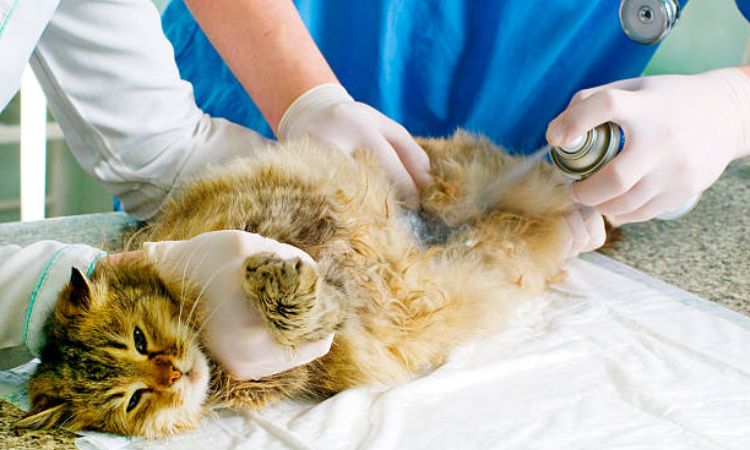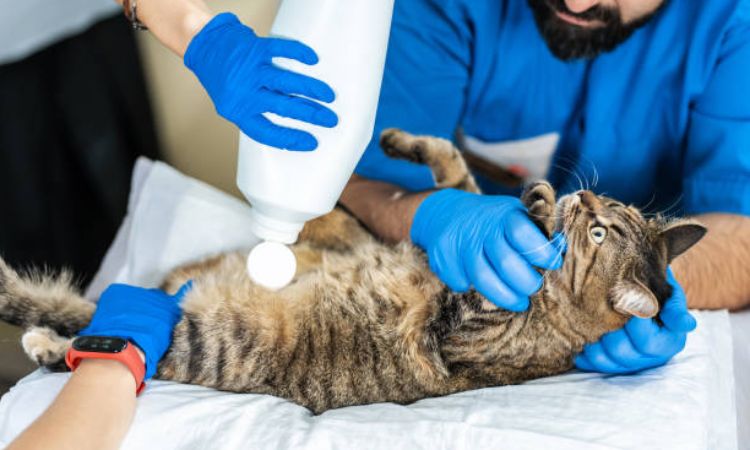Has your cat started marking territory around your home, despite being neutered? Spraying and urine marking can occur in cats of any age or sex, but neutering usually helps reduce this behavior significantly. So why do some male cats still spray after the procedure? Join Nexus-Pets as we explore the reasons behind post-neuter spraying and share practical tips to keep your home clean and stress-free.

What Is Cat Spraying?
Cat spraying is a specific type of urination that is distinct from regular bathroom use. Unlike normal urination, which usually occurs in a litter box or designated area, spraying involves a cat releasing small amounts of urine onto vertical surfaces such as walls, furniture, or doors. This behavior is not necessarily related to needing to relieve the bladder but serves other purposes.
Cats spray primarily to communicate and mark their territory. Through urine marking, a cat can signal ownership of a space, establish social boundaries, or convey information to other cats in the area. Spraying can also occur in response to stress or environmental changes, such as the presence of new pets, unfamiliar animals outside, or changes in household routines. Understanding the reasons behind spraying is essential for addressing the behavior effectively and ensuring a calm, secure environment for your cat.
Impact of Neutering on Spraying
Neutering a male cat has a significant influence on behaviors driven by hormones, including spraying. By surgically removing the testicles, neutering drastically reduces the production of testosterone, the primary male sex hormone responsible for territorial marking and mating behaviors. As a result, many behavioral issues such as urine marking, roaming, and aggression are often minimized or eliminated.
However, neutering does not guarantee that all spraying will stop. Studies and veterinary observations suggest that approximately 10–20% of neutered male cats may continue to spray even after being fixed. This can occur due to residual hormones, learned habits formed before neutering, or stress-related triggers.
For most cats, spraying behavior declines gradually, with many showing significant improvement within weeks to a few months after surgery. In general, most neutered males who continue to spray tend to stop within six months, provided there are no underlying medical issues or environmental stressors contributing to the behavior.
Neutering remains one of the most effective ways to reduce hormone-driven spraying, but for a small percentage of cats, combining neutering with environmental management, enrichment, and veterinary guidance may be necessary to fully resolve the issue.

Reasons Why Neutered Male Cats May Still Spray
Even after neutering, some male cats continue to exhibit spraying behavior. This can be surprising for owners, but there are several well-documented reasons why it may occur:
- Lingering Hormones: While neutering drastically reduces testosterone, some residual hormones may remain in the cat’s system for several weeks or even months after surgery. Male cats neutered later in life may retain enough testosterone to trigger occasional spraying or sexual behaviors until hormone levels fully decline.
- Stress or Environmental Changes: Cats are sensitive to changes in their environment. Moving to a new home, the introduction of new pets or people, or other shifts in daily routines can cause stress, which may prompt a neutered male to spray as a coping mechanism or to establish a sense of security.
- High-Density Households or Territorial Competition: In homes with multiple cats, territorial instincts can persist even after neutering. Competition for resources such as food bowls, litter boxes, resting spots, or attention from owners can lead some cats to mark their space through spraying, signaling ownership and hierarchy.
- Medical Problems: Underlying health issues, including urinary tract infections, bladder stones, or other urological problems, can cause discomfort or pain when urinating. Cats may spray or mark in unusual locations as a result. Persistent or unusual spraying behavior should always prompt a veterinary examination to rule out medical causes.
By understanding these potential triggers, cat owners can take targeted steps to address spraying, combining environmental management, enrichment, and veterinary care when necessary.
How to Minimize or Prevent Spraying
Even neutered cats may occasionally spray, but there are effective strategies to reduce or prevent this behavior. A combination of environmental adjustments, proper hygiene, and professional guidance can make a significant difference.
1. Environmental Adjustments
Stress is a common trigger for spraying. Minimize sudden changes in your home, maintain a consistent daily routine, and provide a calm, structured environment. Ensure your cat has access to quiet spaces, hiding spots, and elevated areas such as cat trees, which allow them to feel safe and in control. Limiting exposure to outside cats or other stressors can also help reduce anxiety-related marking.
2. Increase and Properly Place Litter Boxes
Cats prefer clean, accessible litter boxes. A general rule is to provide one litter box per cat, plus an extra. Place boxes in quiet, low-traffic areas and ensure they are cleaned regularly. Avoid placing multiple boxes too close together, as cats may perceive this as competition, which can trigger spraying.
3. Use Enzyme Cleaners to Eliminate Odors
If your cat has already sprayed, clean the affected areas thoroughly with an enzyme-based cleaner. These cleaners break down urine molecules and remove the scent, preventing your cat from returning to mark the same spot. Avoid cleaners containing ammonia, as this can encourage more spraying.
4. Consult a Veterinarian for Health Evaluation
Sometimes spraying is linked to medical issues such as urinary tract infections, bladder stones, or other health problems. If your cat begins spraying unexpectedly or frequently, a veterinary check-up is essential to rule out underlying conditions and ensure your cat is healthy.
5. Behavioral Therapies and Professional Help
In cases where environmental and medical interventions are insufficient, working with a feline behavior specialist can provide targeted strategies to curb spraying. Professionals may recommend behavior modification techniques, pheromone diffusers (like Feliway), or other tools to reduce stress and reinforce positive litter box habits.

Conclusion
While neutering is not a guaranteed cure for spraying in 100% of cases, it is by far the most effective and recommended solution. For the vast majority of male cats, the surgery will completely eliminate the behavior by removing the hormonal driver. If your neutered cat continues to spray, the cause is almost always either a learned behavior or an underlying medical or anxiety-related issue—all of which are treatable. Consulting your veterinarian is always the best first step to ensure your cat’s health and find a path to a clean, happy home.






